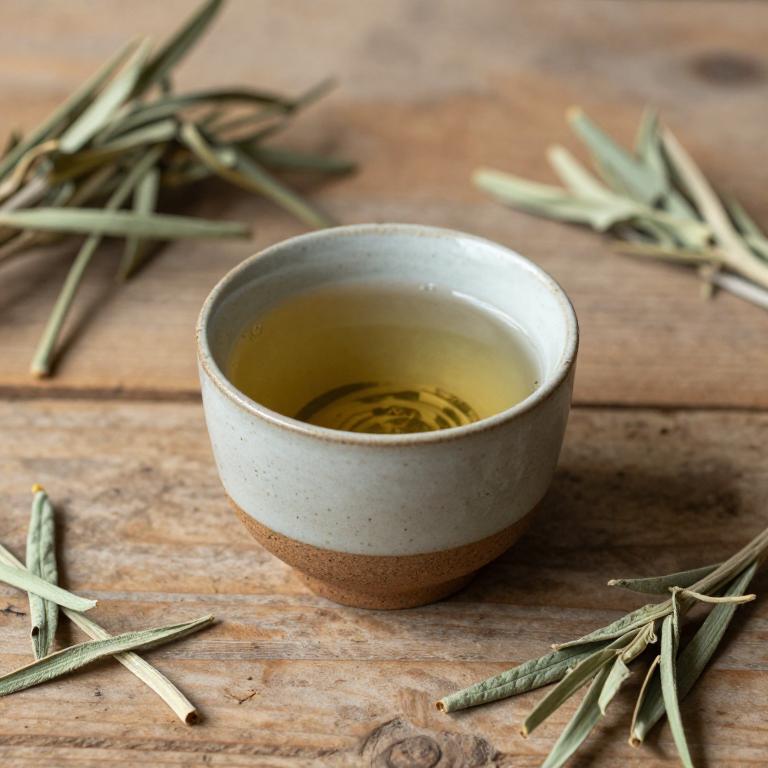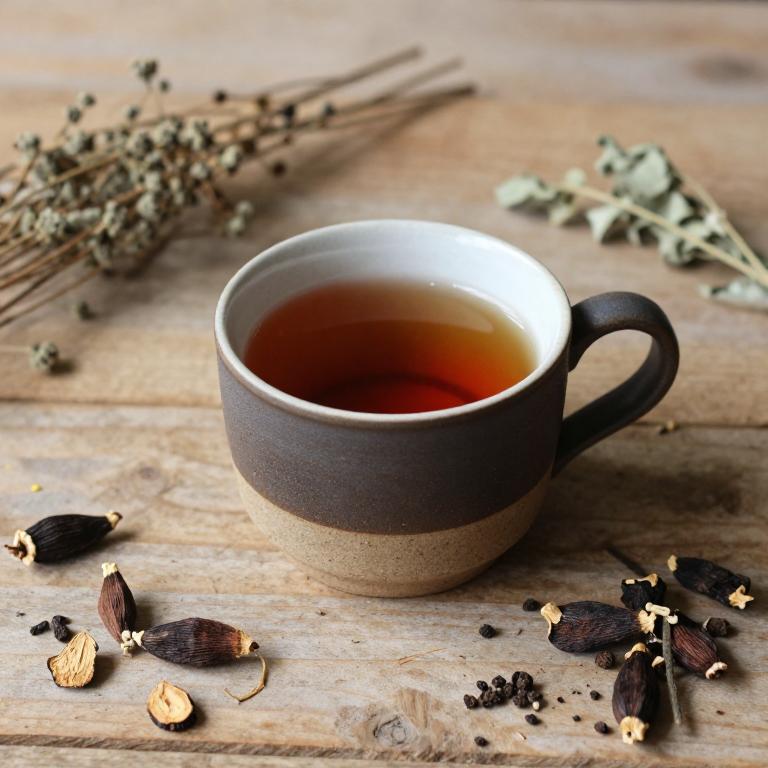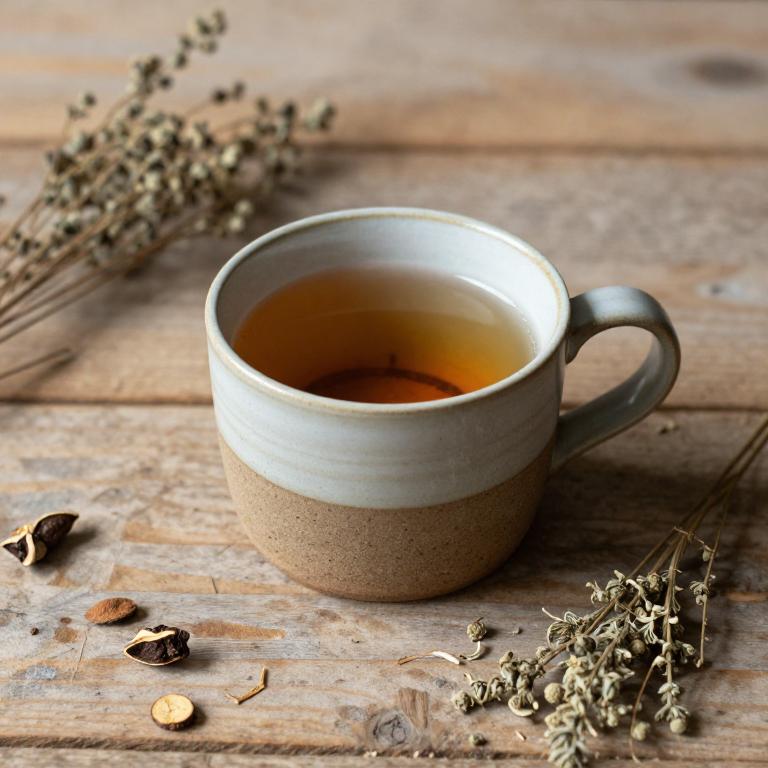10 Best Herbal Teas For Overeating

Herbal teas can be a beneficial addition to a diet aimed at managing overeating by promoting digestion and reducing cravings.
Teas such as peppermint, ginger, and dandelion are known for their ability to soothe the digestive system and enhance nutrient absorption. Some herbal blends also help to calm the nervous system, reducing emotional eating triggers. Drinking herbal tea can also serve as a mindful practice, encouraging slower eating and greater awareness of hunger cues.
Overall, incorporating herbal teas into a healthy lifestyle can support weight management and improve overall well-being.
Table of Contents
- 1. Camellia (Camellia sinensis)
- 2. Ginger (Zingiber officinale)
- 3. Fennel (Foeniculum vulgare)
- 4. Thistle (Silybum marianum)
- 5. Licorice (Glycyrrhiza glabra)
- 6. Lemon grass (Cymbopogon citratus)
- 7. Black pepper (Piper nigrum)
- 8. Blessed thistle (Cnicus benedictus)
- 9. Peppermint (Mentha piperita)
- 10. Ceylon cinnamon (Cinnamomum verum)
1. Camellia (Camellia sinensis)

Camellia sinensis, the plant from which green, black, and white teas are derived, contains bioactive compounds such as caffeine, catechins, and polyphenols that may influence metabolism and appetite.
While it is not a direct treatment for overeating, some studies suggest that the caffeine and antioxidants in Camellia sinensis may help enhance satiety and reduce caloric intake by improving digestive efficiency. Herbal teas made from Camellia sinensis are often consumed as a natural alternative to sugary beverages, potentially helping to curb cravings and promote healthier drinking habits. However, it is important to note that these teas should be part of a balanced diet and lifestyle rather than a standalone solution for overeating.
Overall, Camellia sinensis herbal teas may offer supportive benefits for managing overeating, though more research is needed to fully understand their long-term effects.
2. Ginger (Zingiber officinale)

Zingiber officinale, commonly known as ginger, is widely used in herbal teas to aid in digestion and support the body's natural processes after overeating.
The active compounds in ginger, such as gingerol and shogaol, help stimulate the digestive system, promoting the movement of food through the stomach and reducing feelings of bloating and discomfort. Drinking ginger tea can also help alleviate nausea and soothe the stomach, making it a valuable remedy for those who experience digestive upset after consuming excessive amounts of food. Its warming properties help to counteract the sluggishness often associated with overeating, encouraging a sense of lightness and well-being.
Overall, zingiber officinale herbal tea is a safe and effective natural remedy that can support digestion and comfort after a heavy meal.
3. Fennel (Foeniculum vulgare)

Foeniculum vulgare, commonly known as fennel, is a versatile herb often used in herbal teas to aid digestion and support weight management.
Fennel tea is particularly beneficial for individuals who tend to overeat, as it can help reduce bloating and promote a feeling of fullness. The essential oils in fennel, such as anethol, have mild laxative and carminative properties that can ease digestive discomfort. Drinking fennel tea after meals may help regulate appetite and support healthy digestion.
However, it is best used as a complementary remedy alongside a balanced diet and lifestyle for optimal results.
4. Thistle (Silybum marianum)

Silybum marianum, also known as milk thistle, is a herbal remedy that has been traditionally used to support liver health and detoxification.
While it is not a direct appetite suppressant, some studies suggest that its active compound, silymarin, may help regulate digestion and reduce bloating, which can be beneficial for individuals who overeat. Herbal teas made from silybum marianum are often consumed to promote a sense of fullness and ease digestive discomfort after large meals. However, it is important to note that silybum marianum should not be viewed as a substitute for healthy eating habits or portion control.
As with any herbal supplement, it is advisable to consult a healthcare professional before incorporating it into a routine for managing overeating.
5. Licorice (Glycyrrhiza glabra)

Glycyrrhiza glabra, commonly known as licorice root, has been traditionally used in herbal medicine for its potential digestive benefits.
When brewed into a tea, licorice root may help soothe the digestive tract and reduce inflammation, which can be beneficial for individuals experiencing discomfort after overeating. Its mild antispasmodic properties may aid in relieving bloating and indigestion, making it a calming option for post-meal relief. However, excessive consumption of licorice root tea can lead to side effects such as hypertension due to its high glycyrrhizin content.
As a complementary remedy, licorice root tea should be used in moderation and under the guidance of a healthcare professional.
6. Lemon grass (Cymbopogon citratus)

Cymbopogon citratus, commonly known as lemon grass, is a popular herbal tea used to support digestion and aid in managing overeating.
This tea is valued for its calming properties and ability to reduce bloating and discomfort after meals. Rich in antioxidants and essential oils, lemon grass tea can help soothe the digestive system and promote a feeling of fullness. It is often recommended as a natural remedy to curb excessive eating by improving digestion and reducing cravings.
Regular consumption of cymbopogon citratus tea may contribute to better digestive health and support weight management efforts.
7. Black pepper (Piper nigrum)

Piper nigrum, commonly known as black pepper, is often used in herbal teas to support digestion and reduce bloating, which can be beneficial for individuals experiencing overeating.
The active compound in black pepper, piperine, enhances the absorption of nutrients and may help improve metabolic function, potentially aiding in managing food intake. While it is not a direct appetite suppressant, the warming properties of black pepper tea can help ease digestive discomfort and promote a feeling of fullness. It is often combined with other herbs like ginger or turmeric to enhance its digestive benefits.
However, it should be consumed in moderation and is not a substitute for a balanced diet and healthy eating habits.
8. Blessed thistle (Cnicus benedictus)

Cnicus benedictus, also known as blessed thistle, is a herbal remedy traditionally used to support digestion and reduce overeating.
This herb is believed to stimulate the digestive system, enhancing nutrient absorption and reducing bloating, which can be common after overeating. It contains compounds such as alkaloids and flavonoids that may help regulate appetite and improve gut health. Blessed thistle is often used in herbal teas to promote a feeling of fullness and reduce cravings, making it a natural aid for those struggling with overeating.
However, it is important to consult with a healthcare professional before incorporating it into a regular routine, especially for individuals with existing health conditions or those taking medications.
9. Peppermint (Mentha piperita)

Mentha piperita, commonly known as peppermint, is a popular herb used in herbal teas to aid in digestion and alleviate symptoms of overeating.
The refreshing scent and cooling effect of peppermint tea can help soothe a bloated stomach and reduce feelings of discomfort after consuming excessive food. It is believed that the menthol in peppermint stimulates the digestive system, promoting better nutrient absorption and reducing gas and nausea. Peppermint tea is often recommended as a natural remedy for those experiencing indigestion or a heavy feeling after a large meal.
Regular consumption of peppermint herbal tea may also help regulate appetite and support overall digestive health.
10. Ceylon cinnamon (Cinnamomum verum)

Cinnamomum verum, commonly known as true cinnamon, is often used in herbal teas to support digestion and promote a sense of fullness after overeating.
The warm, aromatic properties of cinnamon can help soothe the digestive system and ease bloating or discomfort caused by consuming excessive food. When brewed into a tea, cinnamon may also help regulate blood sugar levels, which can be beneficial after a heavy meal. To prepare the tea, simply steep a teaspoon of cinnamon bark in hot water for several minutes.
While cinnamon tea is generally safe for most people, it is advisable to consult a healthcare professional before using it as a regular remedy, especially for those with diabetes or sensitive digestive systems.